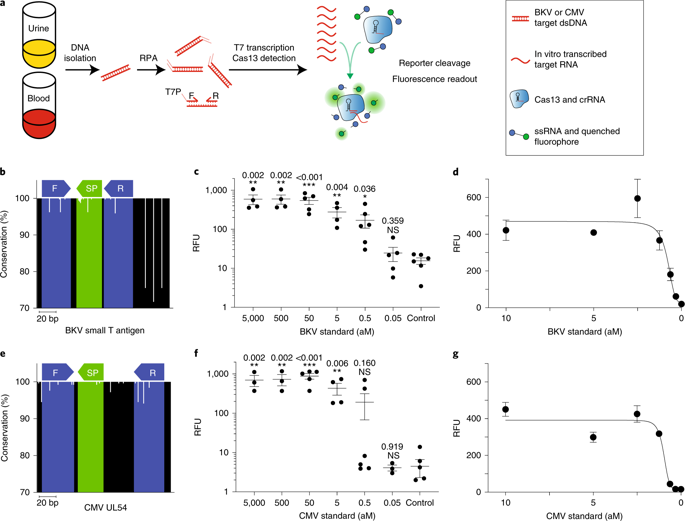Nature Biomedical Engineering ( IF 26.8 ) Pub Date : 2020-04-13 , DOI: 10.1038/s41551-020-0546-5 Michael M Kaminski 1, 2, 3 , Miguel A Alcantar 1 , Isadora T Lape 4 , Robert Greensmith 2, 3 , Allison C Huske 1 , Jacqueline A Valeri 1, 5 , Francisco M Marty 6 , Verena Klämbt 7 , Jamil Azzi 4 , Enver Akalin 8 , Leonardo V Riella 4 , James J Collins 1, 5, 9

|
In organ transplantation, infection and rejection are major causes of graft loss. They are linked by the net state of immunosuppression. To diagnose and treat these conditions earlier, and to improve long-term patient outcomes, refined strategies for the monitoring of patients after graft transplantation are needed. Here, we show that a fast and inexpensive assay based on CRISPR–Cas13 accurately detects BK polyomavirus DNA and cytomegalovirus DNA from patient-derived blood and urine samples, as well as CXCL9 messenger RNA (a marker of graft rejection) at elevated levels in urine samples from patients experiencing acute kidney transplant rejection. The assay, which we adapted for lateral-flow readout, enables—via simple visualization—the post-transplantation monitoring of common opportunistic viral infections and of graft rejection, and should facilitate point-of-care post-transplantation monitoring.
中文翻译:

基于CRISPR的检测方法,用于检测移植后的机会性感染并监测移植排斥反应。
在器官移植中,感染和排斥是造成移植物丢失的主要原因。它们通过免疫抑制的净状态联系在一起。为了更早地诊断和治疗这些疾病并改善长期患者的结局,需要完善的策略来监测移植后的患者。在这里,我们证明了基于CRISPR–Cas13的快速而廉价的分析能够准确地从患者的血液和尿液样本以及CXCL9中检测BK多瘤病毒DNA和巨细胞病毒DNA。急性肾移植排斥反应患者尿液中信使RNA(移植排斥反应的标志物)水平升高。我们通过横向可视化的方法,通过简单的可视化方法,对常见的机会性病毒感染和移植物排斥反应进行了移植后监测,并应促进移植后即时护理。











































 京公网安备 11010802027423号
京公网安备 11010802027423号